For the 2025 school year, there are 2 public elementary schools serving 256 students in Wausaukee School District. This district's average elementary testing ranking is 1/10, which is in the bottom 50% of public elementary schools in Wisconsin.
Public Elementary Schools in Wausaukee School District have an average math proficiency score of 20% (versus the Wisconsin public elementary school average of 41%), and reading proficiency score of 12% (versus the 38% statewide average).
Minority enrollment is 8% of the student body (majority Hispanic), which is less than the Wisconsin public elementary school average of 35% (majority Hispanic and Black).
Overview
This School District
This State (WI)
# Schools
3 Schools
1,586 Schools
# Students
381 Students
535,621 Students
# Teachers
32 Teachers
40,388 Teachers
Student : Teacher Ratio
12:1
12:1
District Rank
Wausaukee School District, which is ranked within the bottom 50% of all 444 school districts in Wisconsin (based off of combined math and reading proficiency testing data) for the 2021-2022 school year.
The school district's graduation rate of 80-89% has decreased from 90% over five school years.
Overall District Rank
#427 out of 450 school districts
(Bottom 50%)
(Bottom 50%)
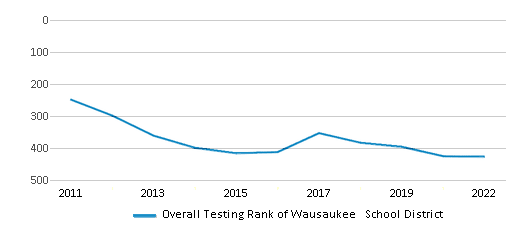
Math Test Scores (% Proficient)
20-24%
39%
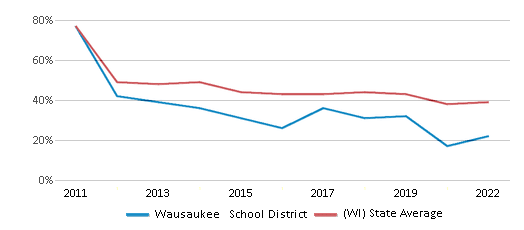
Reading/Language Arts Test Scores (% Proficient)
10-14%
38%
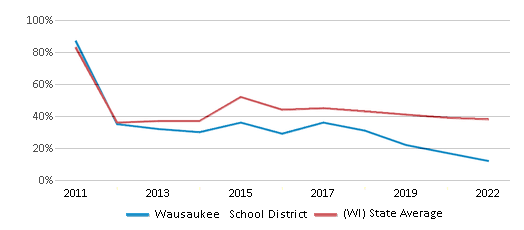
Science Test Scores (% Proficient)
25-29%
44%
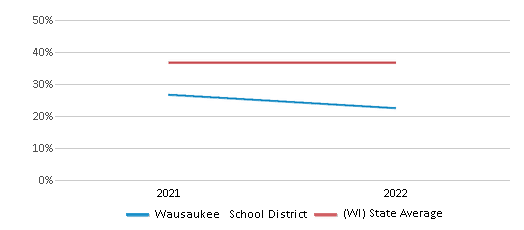
Graduation Rate
80-89%
90%
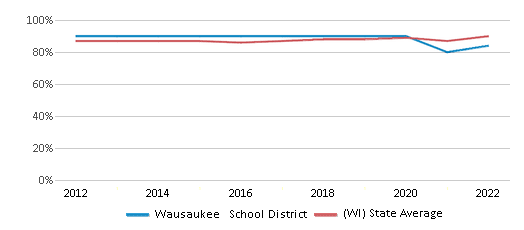
Students by Ethnicity:
Diversity Score
0.14
0.55
# American Indian Students
1 Student
6,515 Students
% American Indian Students
n/a
1%
# Asian Students
n/a
23,574 Students
% Asian Students
n/a
4%
# Hispanic Students
12 Students
75,919 Students
% Hispanic Students
3%
14%
# Black Students
2 Students
50,658 Students
% Black Students
1%
10%
# White Students
353 Students
347,991 Students
% White Students
93%
65%
# Hawaiian Students
n/a
422 Students
% Hawaiian Students
n/a
n/a
# Two or more races Students
13 Students
30,466 Students
% of Two or more races Students
3%
6%
Students by Grade:
# Students in PK Grade:
26
35,005
# Students in K Grade:
28
50,552
# Students in 1st Grade:
18
53,742
# Students in 2nd Grade:
20
55,228
# Students in 3rd Grade:
17
55,323
# Students in 4th Grade:
38
55,906
# Students in 5th Grade:
31
56,303
# Students in 6th Grade:
22
56,734
# Students in 7th Grade:
36
49,193
# Students in 8th Grade:
20
49,927
# Students in 9th Grade:
22
4,138
# Students in 10th Grade:
39
4,221
# Students in 11th Grade:
38
4,465
# Students in 12th Grade:
26
4,884
# Ungraded Students:
-
-
District Revenue and Spending
The revenue/student of $17,903 is higher than the state median of $17,039. The school district revenue/student has stayed relatively flat over four school years.
The school district's spending/student of $17,257 is higher than the state median of $17,011. The school district spending/student has stayed relatively flat over four school years.
Total Revenue
$7 MM
$13,869 MM
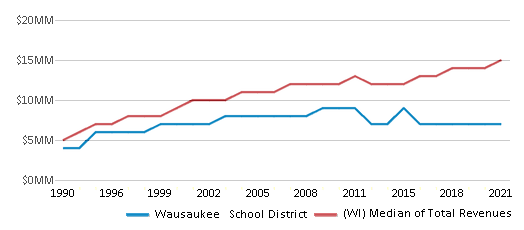
Spending
$7 MM
$13,846 MM
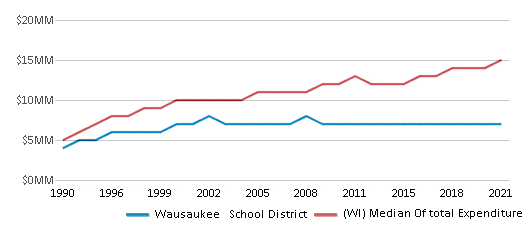
Revenue / Student
$17,903
$17,039
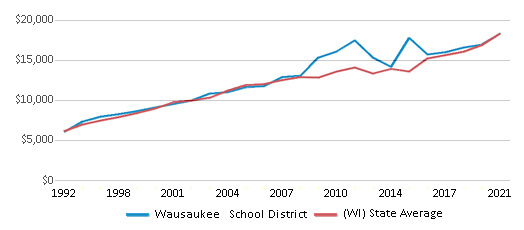
Spending / Student
$17,257
$17,011
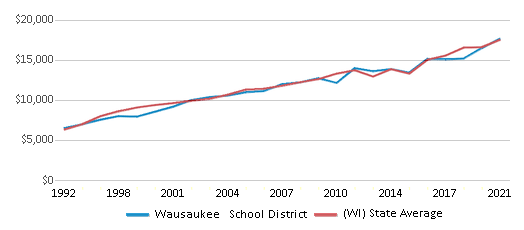
Best Wausaukee School District Public Elementary Schools (2025)
School
(Math and Reading Proficiency)
(Math and Reading Proficiency)
Location
Grades
Students
Rank: #11.
Wausaukee Elementary School
(Math: 25-29% | Reading: 10-14%)
Rank:
Rank:
2/
Bottom 50%10
N11941 Us Highway 141
Wausaukee, WI 54177
(715) 856-5152
Wausaukee, WI 54177
(715) 856-5152
Grades: PK-4
| 147 students
Rank: #22.
Wausaukee Middle School
(Math: 10-14% | Reading: 10-14%)
Rank:
Rank:
1/
Bottom 50%10
N11941 Us Highway 141
Wausaukee, WI 54177
(715) 856-5152
Wausaukee, WI 54177
(715) 856-5152
Grades: 5-8
| 109 students
Recent Articles

Year-Round Or Traditional Schedule?
Which is more appropriate for your child? A year-round attendance schedule or traditional schedule? We look at the pros and cons.

Why You Should Encourage Your Child to Join a Sports Team
Participating in team sports has a great many benefits for children, there is no doubt. In this article you will learn what those benefits are.

White Students are Now the Minority in U.S. Public Schools
Increasing birth rates among immigrant families from Asia and Central and South America, combined with lower birth rates among white families, means that for the first time in history, public school students in the United States are majority-minority. This shift in demographics poses difficulties for schools as they work to accommodate children of varying language abilities and socio-economic backgrounds.





